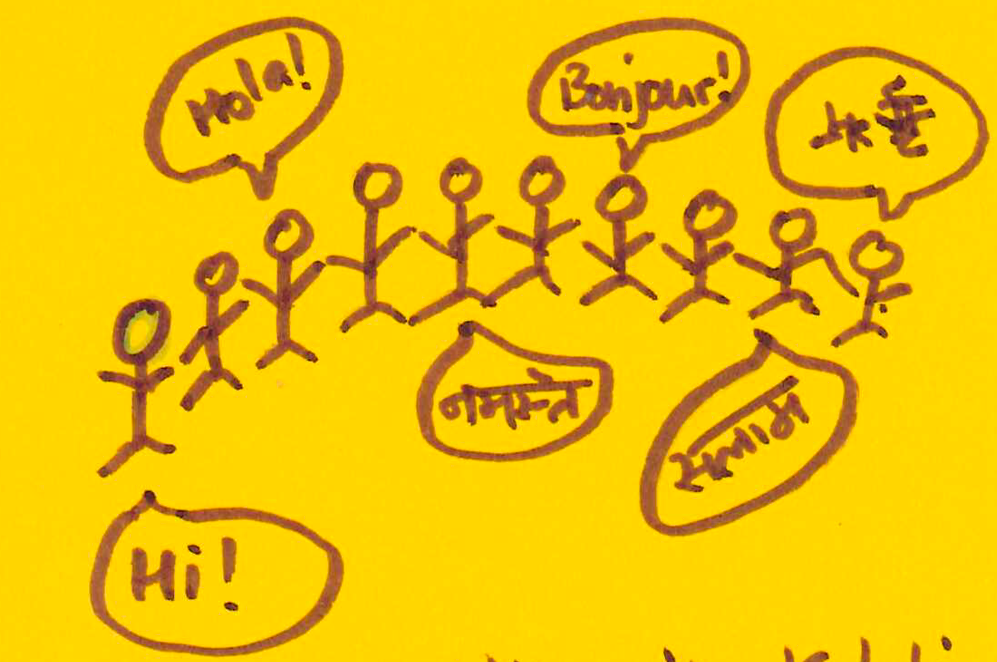
Bahá’u’lláh’s Call for a Common Language for the World
We live on the same planet, we breathe the same air, we belong to the same community of humankind. Yet we don’t speak the same language. Often we can’t understand each other at all. Many times we struggle to communicate well.
It’s clear enough what an impediment the absence of a common human language is to peace and understanding in the world. Bahá’u’lláh calls for the adoption of such a language.
It is incumbent upon all nations to appoint some men of understanding and erudition to convene a gathering and through joint consultation choose one language from among the varied existing languages, or create a new one, to be taught to the children in all the schools of the world.
The day is approaching when all the peoples of the world will have adopted one universal language and one common script. When this is achieved, to whatsoever city a man may journey, it shall be as if he were entering his own home. These things are obligatory and absolutely essential. It is incumbent upon every man of insight and understanding to strive to translate that which hath been written into reality and action.[1]
Bahá’u’lláh also counsels parliaments to give attention to this issue:
O members of parliaments throughout the world! Select ye a single language for the use of all on earth, and adopt ye likewise a common script. [2]
It is a measure that Bahá’u’lláh regards as a sign of humanity’s maturity.
There are numerous developments that have begun the process of getting there. English is already a de facto common tongue for many international purposes. The United Nations has formally chosen six international languages as the official languages for its work: Arabic, Chinese, English, French, Russian and Spanish. English, French and Spanish are typically its working languages. Various efforts have been made to invent an international language — for example Esperanto or Interlingua. In the 21st century, information technology is being used to provide reasonably understandable automatic translation between languages. Increasingly we communicate with human beings anywhere, and the need for a common language for doing so becomes more indispensable.
‘Abdu’l-Bahá identifies the adoption of a common auxiliary language as a core principle of Bahá’u’lláh’s teachings, and like many instances examined already, this concept forms part of a multidimensional matrix of principles which support the emergence of the oneness of humanity.
Image Credits: By Niharikakohli (Own work) [CC BY-SA 4.0 (http://creativecommons.org/licenses/by-sa/4.0)], via Wikimedia Commons)
This article is the 35th in a series of what I hope will become 200 articles in 200 days for the 200th anniversary of the birth of Bahá’u’lláh. The anniversary is being celebrated around the world on 21 and 22 October 2017. The articles are simply my personal reflections on Bahá’u’lláh’s life and work. Any errors or inadequacies in these articles are solely my responsibility.
Farsi Translation:
دوستان عزيز
خوشبختانه انانيكه مايلند ميتوانند اين مقالات را در وبسايت “تارنماى” زير بفارسى مطالعه فرمايند.
http://www.noghtenazar.org/node/1519







One Comment
Paul Desailly
https://beyondforeignness.org/3848
Young people in particular, such as my teenage sons Edwin and Amin, will find your approach to the international auxlang principle appealing. When new scholarship demonstrating the Esperantism of Baha’u’llah is well and widely discussed the Baha’i world will apprehend and then appreciate Abdul Baha’s promise that “the love and effort put into Esperanto will not be lost.” https://www.bandeeducation.com/baha-u-llah-was-an-esperantist